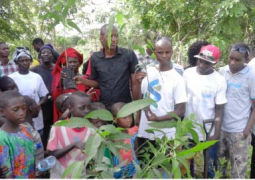The representative of the United Nations Food and Agricultural Organization (FAO) to The Gambia has disclosed that the
Dr Babagana Ahmadu added that a wide variety of high value tropical and off-season fresh fruits and vegetables are now grown in The Gambia for the domestic, tourist and export markets.
Speaking yesterday at a consultative workshop on the development of a national horticulture master-plan, which brought together main players and other stakeholders in the horticulture sector, at the Paradise Suites Hotel in Kololi, Dr Ahmadu said horticulture in The Gambia “is charactised by small holder plot gardens where the major source of water for irrigation is groundwater” through shallow hand-dug or concrete lined wells.
He added that there are few commercial enterprises in the country, such as Radville Farmers, Gambia Horticultural Enterprise (GHE) and Kharafi Farms.
“Nearly 88% of all women farmers in The Gambia are estimated to be engaged in individual or communal horticultural activities, which include the growing of perennial crops, and most of the vegetables are grown in the dry season - November to June - with limited yields and regard for quality,” the FAO country rep noted.
For his part, the Deputy Minister of Agriculture, Kalifa Kambi, said that some two months ago, the Ministry of Agriculture organised a business meeting on the Gambia National Agricultural Investment Plan (GNAIP) as a means to finalize the investment plan as well as sensitize donors on the medium-term plan for the agriculture sector.
“The plan is an ECOWAS initiative, and was developed through a highly consultative process involving farmers, NGOs, private sector, government agencies and development partners at the regional, sub-regional and global levels,” he said.
Hon. Kambi added that the plan is a five-year programme that runs from January 2011 to December 2015.
The development of the proposed horticultural master plan would be a giant step towards the achievement of the objectives of the GNAIP, the Agriculture deputy minister said.
“Consider this workshop to be the first initiative of actualizing the implementation of the investment plan,” he told the participants.
Deputizing the director-general of Agriculture, Musa Huma said the workshop was held to consult and share experiences with all the stakeholders and cooperating partners in Agriculture and the natural resources for the development of a horticultural master plan.
He noted: “The horticultural sub-sector has been expanding very fast these years, thus becoming an important source of income food and nutrition security and employment for the farmers, more so the women farmers, and the sub-sector is very dynamic and is attracting a lot of attention from government, donor agencies, merchants and individuals.”
He said the sub-sector has a great potential to increase agriculture production, export expansion, diversification, nutrition enhancement, increased income and household food security of farmers and farm families as envisaged in Vision 2020 and MDG goal number one.
“One of the biggest challenges on horticultural production is the post-harvest loss problems,” he said, adding that it is therefore pertinent to put emphasis on the value chain approach, as well as link producers and buyers.
Read Other Articles In Article (Archive)
Alleged theft case continues
Mar 2, 2012, 12:23 PM



